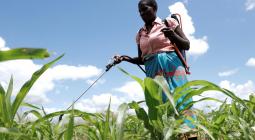For Lacina Koné, the future of digital technology and AI lies in Africa
At the 38th Mobile World Congress (MWC), which closed on 29 February 2024 in Barcelona, Spain, Lacina Koné, CEO of the pan-African digital sovereignty platform Smart Africa, answered questions from accredited journalists, including Afrik21. Among other things, he discussed Africa's position in the global artificial intelligence (AI) market and the challenges of digital transformation for more sustainable development on the continent.
At the 38th Mobile World Congress (MWC), which closed on 29 February 2024 in Barcelona, Spain, Lacina Koné, CEO of the pan-African digital sovereignty platform Smart Africa, answered questions from accredited journalists, including Afrik21. Among other things, he discussed Africa’s position in the global artificial intelligence (AI) market and the challenges of digital transformation for more sustainable development on the continent.
Africa will have recorded 836 billion dollars in mobile money services by 2022. This represents two-thirds of transactions worldwide. These figures are the pride of Lacina Koné, one of the leading economic figures to have taken part in the Mobile World Congress (MWC) from 26 to 29 February 2024 in Spain. According to the Director General of Smart Africa (a pan-African platform for digital sovereignty created by Rwandan President Paul Kagame), the future of digital technology and artificial intelligence (AI) will not be played out without Africa.
Speaking to journalists who had travelled to Barcelona, he said that the digital transformation ecosystem had created “a lot of illiterate people”, while AI, which is currently attracting unprecedented international interest (American and European regulations), should help to “close the digital divide” through the translation business. It’s a huge market of 3,000 national languages that young people and local start-ups need to explore. According to the former adviser to Ivorian President Alassane Ouattara, “the major international groups will not come here to develop coding in Wolof (the language of Senegal) or Bambara (the language of Mali)”.
The engineer, who helped Benin draw up its National Strategy for Artificial Intelligence and Megadata (SNIAM) just after Ghana, nevertheless points out that “AI is not essential in all sectors”, but complements digital technology as a kind of co-pilot. And he insists on the need to “think differently to be able to better grasp the progress brought about by innovation. AI is not there to replace human value, but to make it more efficient (in the case of arduous jobs)”.
In a country like Niger (density of 18 people/km2) where there are not enough doctors, mainly in rural areas, Lacina Koné advocates the use of AI, which has already proved its worth in e-health “at least for diagnosis and if possible to provide first aid remotely”, he explains. Concluding his press briefing at the MWC in Barcelona, the graduate of the American University of George Washington called on African governments and regulators to reduce Internet access charges. Lacina Koné was inspired by the recommendations of the United Nations, which advocate “setting costs at less than 2% of monthly income” for this essential service. However, the quality of optical fibre is another issue, particularly in Central Africa where consumer discontent is no longer a secret.
Cover photo: By AFRIK21




